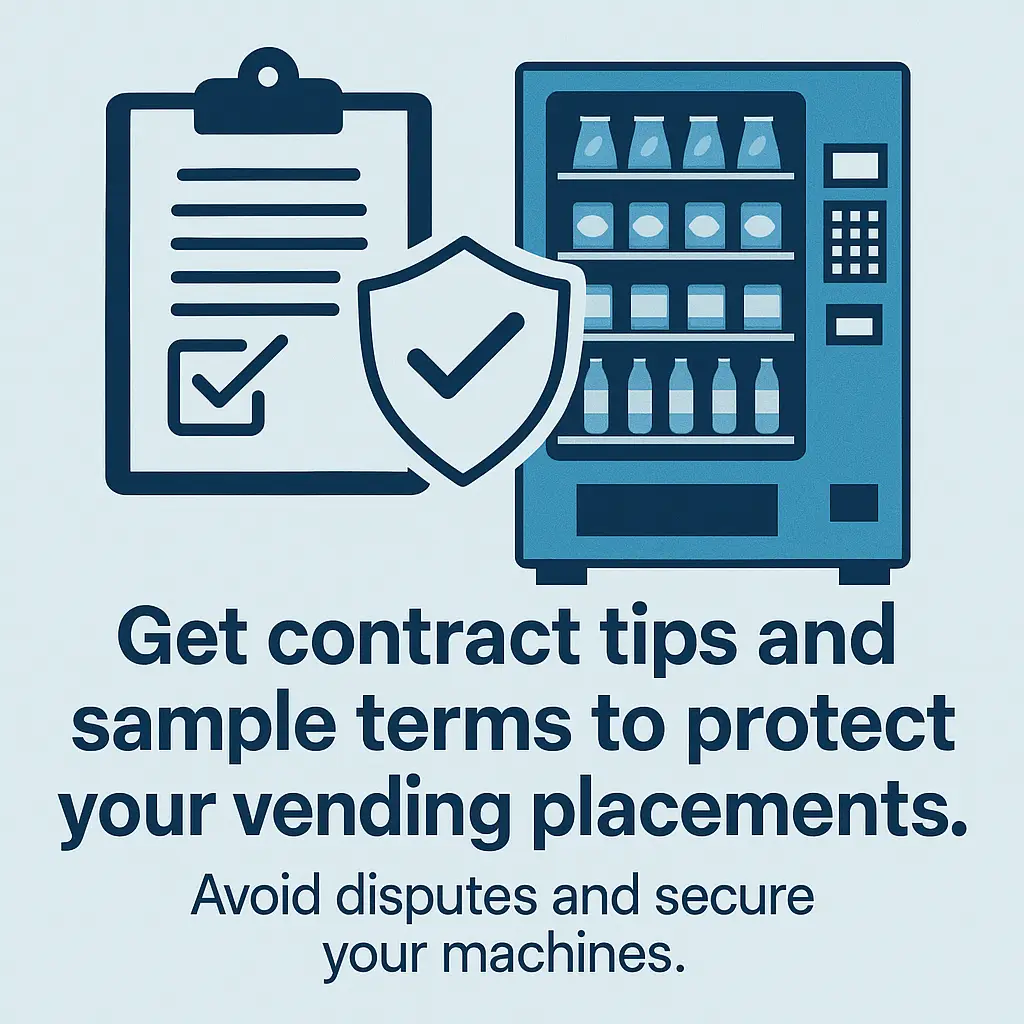Vending Location Agreements & Contracts Guide
Get contract tips and sample terms to protect your vending placements. Avoid disputes and secure your machines.
Back to Vending Machine Locators ResourcesGet contract tips and sample terms to protect your vending placements. Avoid disputes and secure your machines.
Back to Vending Machine Locators ResourcesStart your 30-day free trial and get instant SMS and email alerts whenever a local business needs vending service. These are real location leads to help you grow your route — you decide which ones to buy, no obligations or contracts.
![]() Clear contracts help prevent disputes with property managers
Clear contracts help prevent disputes with property managers
![]() Defined terms protect vendor rights and placement security
Defined terms protect vendor rights and placement security
![]() Commission clauses keep both parties aligned and accountable
Commission clauses keep both parties aligned and accountable

For vending operators, having a sound vending location agreement is essential to protect your investments, build strong relationships, and avoid operational risks. Whether you’re placing a snack machine in an office or setting up multiple units in an apartment complex, every location should be governed by a written contract. Verbal agreements often lead to disputes, particularly around machine removal, payment terms, or equipment responsibility.
A complete vending contract should clearly define key responsibilities. First, make sure the agreement specifies who is responsible for machine servicing, restocking, maintenance, and utilities. Include detailed timelines for responses to service calls and product refills to prevent misunderstandings.
Property access is another critical component. Your contract should guarantee safe and convenient access to machines during business hours. It’s also smart to include exclusivity clauses to ensure no competing vendors are placed at the same location without your consent.
Most vending contracts include terms around commissions paid to the host location. Specify how much commission will be paid, how often, and what sales data will be shared with the property. Always clarify that commissions are based on net sales, not gross, and include a process for accurate reporting.
Another important term is the agreement duration and renewal terms. A 12- to 36-month initial term with auto-renewal or negotiation clauses gives you placement stability while allowing flexibility. Also include early termination language and liability coverage in case of equipment damage or theft.
Secure your agreements with written sign-off from the property manager or building owner. These signed contracts protect your rights as a vendor and help build long-term clients who trust your professionalism.
If you’re just getting started in vending, you might also want to read about the advantages and disadvantages of vending ownership to better understand the business model. Additionally, get an estimate of startup costs by checking out our guide to vending business expenses.
Vending Exchange connects vending operators with real businesses actively looking for vending services—including traditional machines, AI coolers, and office coffee. Get instant SMS and email alerts when new opportunities are available in your area. No contracts or monthly fees—just buy the leads you want. Start your free 30-day trial today and grow your vending business on your terms.
A written agreement protects your placement, outlines responsibilities, and helps avoid disputes over services, commissions, or machine access.
Include service terms, commission rates, placement duration, machine responsibility, access rights, and exclusivity clauses.
Without a contract, you risk losing your machine placement or facing sudden changes to terms with no legal protection.
Include an exclusivity clause in your vending contract that prohibits competing machines during your agreement term.
The contract should define liability. Typically, the vending operator covers repairs unless damage was due to property negligence.
Commission rates vary but usually range from 5% to 20% depending on location type and sales volume. Be clear in the agreement.
Yes, if the contract includes an early termination clause. Include notice requirements and any penalties for early termination.
Yes, auto-renewal terms help maintain stability and avoid sudden disruption unless terminated by either party with notice.
While not mandatory, it’s wise to mention insurance in the contract to protect against loss or liability.
A signed contract helps you enforce payment, and you may need to withhold service or pursue legal action if disputes arise.